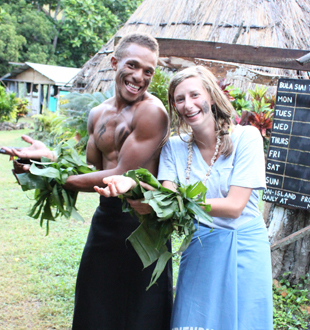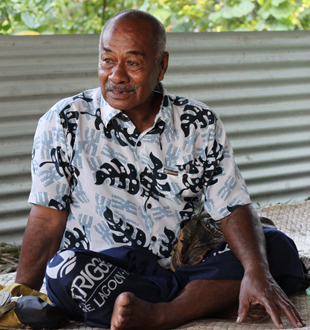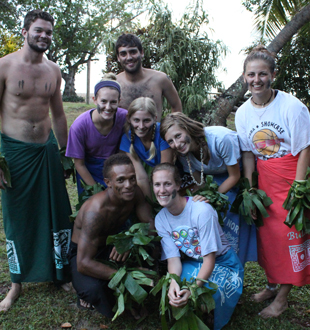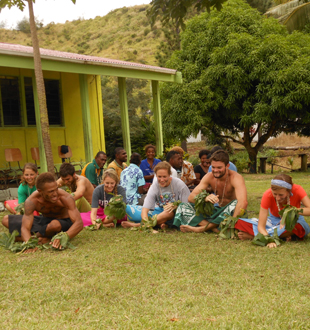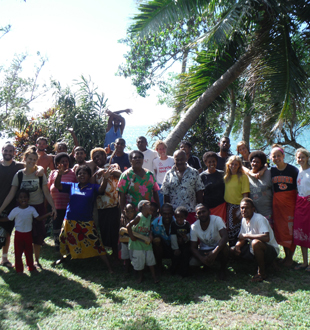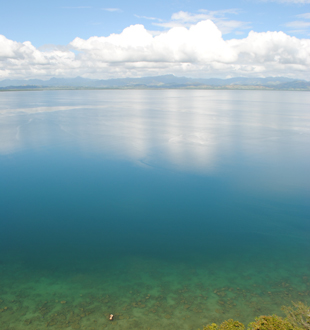| Future Students | Students | Scholars & Faculty | Alumni & Global Community | Donate |
Fiji Study Abroad Program Shapes Student’s Future
AUBURN – Sydney Herndon, a Birmingham native who just graduated with a degree in anthropology, was no stranger to studying abroad.
Her Auburn experience included a month in Spain and half a year in Costa Rica. She was even set to graduate in May, but a conversation with her professor and the allure of one more abroad experience convinced her to push back graduation until August.
It was worth it.
"There was something about this trip. … It wasn’t like the typical study abroad," Herndon said as she tried to piece together her thoughts about a life-changing experience. "We weren’t in class for part of the day or anything. It was just at a different level; the people being so open. I’ve made friends in other countries, but I’ve never felt so immersed and so part of a community before."
Herndon was part of the Fiji Sustainability in Action study abroad program, a three-week program where students and professor Kate Thornton lived on the tiny Fijian island of Vorovoro among the inhabitants of the island’s native tribe.
"We did a lot of small sustainability projects. We did this thing called ’Leaf for Life’ where we taught them how to dry leaves that had nutrition in them to add to their food. We built an example of desalination so that they could use ocean water to get fresh water. Then we looked at a lot of their sustainability stuff involving things like composting toilets and their water system," Herndon said.
Thornton serves as the director of hunger and sustainability initiatives at Auburn’s Hunger Solutions Institute in the College of Human Sciences. She led Herndon’s group in Fiji.
Thornton discovered Vorovoro after seeing a National Geographic special on the small island and visited in late 2010 as a reprieve from her dissertation. When a grant opportunity for new study abroad programs presented itself last summer, she submitted a proposal for the Fiji project and was approved.
"Living and working on Vorovoro is truly an amazing experience," Thornton said. "While there we lived completely off the grid. Our only electricity came from a small solar panel and a small windmill. We brought along solar powered Christmas lights that gave us some light in the eating area and kitchen.
"Our source of water was via several 10,000-gallon rainwater catchment drums. These are set up on the top of a hill with a hand powered water pump. Our filtered drinking water and showering water came from these."
Herndon added, "We took showers in a bucket shower where we had to hoist the bucket up. It’s beautiful. It’s so cool to take a shower in the open. It’s a lot like camping."
There was also a large element of business and marketing education involved in the abroad trip as the students worked with a company called Bridge the Gap Villages.
"It’s a business that is just starting up, and it’s really focusing on doing ecotourism in a very sustainable way, especially for the people of Vorovoro," Herndon explained. "We wrote about our experiences for their website’s blog. We talked with Jimmy (Cahill), who started Bridge the Gap, about how to make it sustainable both economically and socially.
"We got to talk to Chief Tui Mali, too, about what we saw on the island and our take on how great the island was and how other students would be able to come here and learn so much."
Thornton said the abroad trip educated students about tourism and how visitors experience the Fijian islands compared to a typical, native Fijian.
"Life on the island teaches students not only about living sustainably, but also about the economic realities of living in the developing world. They were able to experience, through a full-immersion program, the life of typical Fijians in rural Fiji as well as contrast this, via several resort experiences, to the life that tourists experience in Fiji," Thornton said.
Herndon said Vorovoro is tropical and lush with beautiful beaches and nearby coral reefs, but with her anthropological background, she found the people to be the most fascinating part of the experience.
"They’re the warmest people and are so open and so willing to share their culture, which was just unlike anything I’ve seen before," Herndon said.
Herndon added the trip provided her with the confidence to pursue a degree in international development at the graduate level as she finishes her time at Auburn. The trip proved to her the skills and knowledge she developed at Auburn can make a difference in faraway locales.
"I always tell people who ask me about this trip that I got to take everything I had learned in my anthropology classes and my sustainability classes and apply it," Herndon said. "People on the trip who were doing marketing and business and nutrition classes said the exact same thing.
"They took all these things they had been learning over the past few years in classes, and they really had the opportunity to apply it in real life, which is why you come to college. It was really cool, especially right before graduating, to be able to be like, ’Oh, I did learn things I can use in the real world.’ That was probably one of the best aspects of the trip."
Last Updated: September 7, 2013

